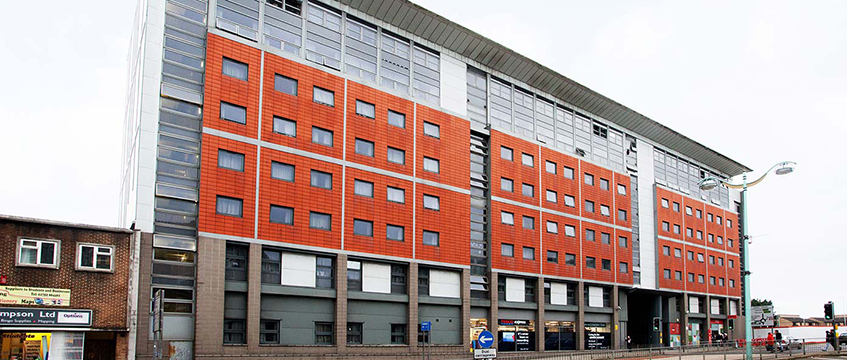Take-up in the UK’s private purpose-built student accommodation sector has surged in the past five years, according to a new report polling 70,000 students and new applicants.
The report by higher education admissions service UCAS and Knight Frank, thought to be the largest of its kind in the UK, found that around 30% of full-time first-year students live in private PBSA, up from 22% five years ago.
A further 40% live in halls or accommodation provided by the university, which has remained broadly unchanged over the same period. The remaining 30% of first-year students live either in the private rented sector or at home with parents or guardians.
The report also noted that new supply and changing demographics is driving increasing competition for student housing in the UK.
The number of people turning 18 fell this year, and is forecast to drop further next year, but is predicted to rise in 2020 and beyond.
James Pullan, head of student property at Knight Frank, said the PBSA sector in the UK faces “challenges” from policy and competition in what has become an “increasingly global market for higher education”.
He added: “The private sector now accounts for the majority of new PBSA development, and, as universities become more reliant on outside investment to provide new PBSA, greater focus is likely to be placed on the strength of the relationship between the private sector and universities.
“The ability for both to work together and bring new product and innovation to market will be key to future success.”
The survey found that 69% of students who lived in private PBSA said they would recommend their accommodation to new first-year students, compared with 77% of those in university-run accommodation.
Factoring in timings
The report also gathered data on the timing of when students find somewhere to live for the following year, which often affects owner-operator pricing and marketing strategies.
More than 50% of respondents who were first-year students said they had secured accommodation between May and August. Those securing accommodation earlier in the year are typically students with unconditional offers or those who have deferred their studies.
By comparison, second- and third-year students tended to secure their accommodation earlier. Of these, 57% said they had secured their accommodation for the following academic year by the end of March.
Only 25% of second- and third-year students were without accommodation for the following academic year by the end of May.
However, the research noted that timing differences depended on where students lived.
In London, students began searching for somewhere to live for the following academic year early. Almost 8% of first-year students had secured accommodation for the following year before the end of November, perhaps reflecting the number of students taking a year out.
There is more variation for second- and third-year students, which is likely to affect how landlords and PBSA providers will operate.
In Bristol, 65% of second- and third-year students had secured their accommodation by the end of March. However, in Aberdeen the comparable figure was 20%.
While the majority of first-year students live in a form of PBSA, this changes in the second year. Around 72% of students living in PBSA said they planned to move into mainstream private rented accommodation in their second year, which may reflect the availability of PBSA stock.
More than 40% of first-years living in private PBSA were offered an incentive when looking for somewhere to live. Of those that chose accommodation on this basis, 16% said they would not have chosen the same accommodation had the incentive not been offered.
The call for affordability
New development figures suggest that the sector is responding to demand for affordable accommodation. Of the units due to be delivered for the 2018/19 academic year, 62% are categorised as cluster flats.
Pullan said: “Some 84% of students say that their accommodation is affordable, but more than half said the costs were ‘just about’ affordable. The sector is responding to this, evidenced by the shift to cluster flats in new development, which tend to have the lowest rents in PBSA.”
David Best, director of analysis and insight at UCAS, said: “Value for money comes out as the most important factor when decisions about where to live are made.”
After graduation
In terms of retention, 41% of final-year students plan to remain in the city in which they were studying. Graduate retention is highest in London, followed by Edinburgh, Manchester and Birmingham.
More than half said they would move directly into a property in the private rented sector after graduation, with the remainder choosing from a range of other accommodation types, including moving into a family or friend’s home or buying a property.
The report noted: “Cities will need to deliver more vibrant, amenity-rich, flexible living space if they are going to attract and retain the talent pool generated by UK higher education.
“Accommodation influences the decisions student make on where to study, and it will increasingly influence the decisions among graduates on where they choose to work.”
Quality by region
Brighton topped the rankings for satisfaction among students opting for privately operated PBSA. At the other end of the scale, 77% of students were happy with their choices in Manchester.
According to the findings, 85% of students in Glasgow rated the quality of their accommodation as “good” or “excellent”, with a similar percentage seen in Newcastle (86%).
Some 67% of students in Southampton indicated that their private PBSA accommodation represents “excellent value for money”, while the same percentage of third-year students in London plan to stay in the city after graduation.
To send feedback, e-mail pui-guan.man@egi.co.uk or tweet @PuiGuanM or @estatesgazette











